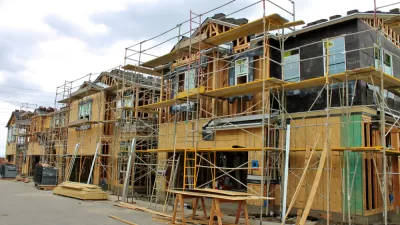A congressional committee advanced a bill recently that would streamline telecommunications infrastructure investments by preempting local control of siting decisions.

The House Energy and Commerce Committee recently marked up H.R. 3557, the American Broadband Deployment Act of 2023, which will preempt local control of wireless telecommunications facility siting.
An article by Angelina Panettieri, written for the National League of Cities, raises awareness about the consequences of the bill for local authority and criticizes the process that produced the bill’s form so far.
“When the committee held an initial hearing on broadband permitting streamlining, including a draft of the American Broadband Deployment Act, no state or local government was invited to testify. NLC and other local stakeholders highlighted the lack of local input, as well as the harms of communications infrastructure preemption for local governments,” writes Panettieri.
According to Panettieri, H.R. 3557 follows a recent pattern of federal and state laws that have undercut the authority of local governments, “from housing and ridesharing to minimum wage and telecommunications.” The impetus for H.R. 3557, according to Panettieri, comes from a desire to streamline planning processes to enable projects funded by the Infrastructure Investment and Jobs Act. According to Panettieri, permit process streamlining “has developed renewed interest as a policy focus for lawmakers from both parties and an opportunity for further preemption.”
Panettieri, who is the Legislative Director for Information Technology and Communications for the National League of Cities, urges local officials to call their congressional representative to oppose the bill.
FULL STORY: House Committee Advances Communications Infrastructure Preemption Bill

Maui's Vacation Rental Debate Turns Ugly
Verbal attacks, misinformation campaigns and fistfights plague a high-stakes debate to convert thousands of vacation rentals into long-term housing.

Planetizen Federal Action Tracker
A weekly monitor of how Trump’s orders and actions are impacting planners and planning in America.

In Urban Planning, AI Prompting Could be the New Design Thinking
Creativity has long been key to great urban design. What if we see AI as our new creative partner?

Pedestrian Deaths Drop, Remain Twice as High as in 2009
Fatalities declined by 4 percent in 2024, but the U.S. is still nowhere close to ‘Vision Zero.’

King County Supportive Housing Program Offers Hope for Unhoused Residents
The county is taking a ‘Housing First’ approach that prioritizes getting people into housing, then offering wraparound supportive services.

Researchers Use AI to Get Clearer Picture of US Housing
Analysts are using artificial intelligence to supercharge their research by allowing them to comb through data faster. Though these AI tools can be error prone, they save time and housing researchers are optimistic about the future.
Urban Design for Planners 1: Software Tools
This six-course series explores essential urban design concepts using open source software and equips planners with the tools they need to participate fully in the urban design process.
Planning for Universal Design
Learn the tools for implementing Universal Design in planning regulations.
planning NEXT
Appalachian Highlands Housing Partners
Mpact (founded as Rail~Volution)
City of Camden Redevelopment Agency
City of Astoria
City of Portland
City of Laramie





























